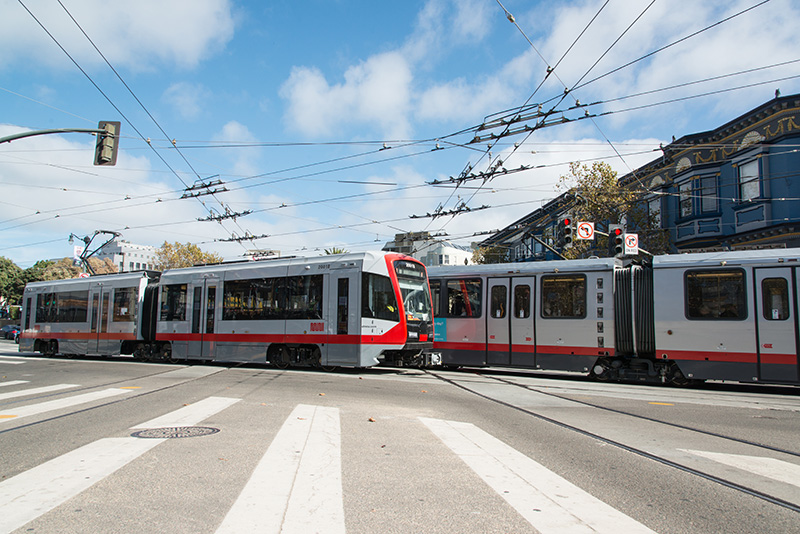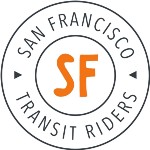The following message was sent from San Francisco Transit Riders (SFTR) to the SFMTA Board of Directors on Monday, January 15, 2024 ahead of the start of the agency’s budget process. The SFMTA faces severe budget deficits in the coming years, and it is crucial that the upcoming budget do all it can to serve transit riders and grow Muni’s ridership.
Following our submission of this letter, at the January 16th SFMTA Board meeting, Board Chair Amanda Eaken recommended that staff create a “Transit First” version of the budget for the Board to review at its upcoming budget workshop on January 30th.
January 15, 2024
Dear Chair Eaken and SFMTA Board Directors,
San Francisco Transit Riders (SFTR) urges you to prioritize public transit and its riders in the SFMTA’s upcoming two-year budget. We understand that the SFMTA’s fiscal situation will be difficult over the next few years, but reject that fare increases and service cuts (even cost-neutral service cuts) are the necessary, appropriate, or inevitable way to balance the budget.
Budget priorities
The SFMTA Board’s top priority while developing this year’s budget should be to increase Muni ridership. Attracting new Muni riders and maintaining existing ones is crucial to ensure the agency’s long-term success. This means that the Board must oppose service cuts and fare increases due to the negative effect they have on ridership.
Our shared goals for Vision Zero, climate change, and housing are all unachievable if the Board does not work intentionally to get as many people as possible out of their cars and onto Muni. Any change in this budget that leads to a slowdown in ridership recovery will lead to delays in all of these goals — delays we cannot afford.
Future local and regional transit funding measures are also less likely to pass if SFMTA implements changes like fare increases that hurt riders and decrease ridership.
Policy direction
While determining the policy priorities of this year’s budget, SFMTA should place it’s top priority in staying true to San Francisco’s Transit First Policy.
The policy — which the SFMTA is required to abide by while conducting its affairs — is clear: “Public transit, including taxis and vanpools, is an economically and environmentally sound alternative to transportation by individual automobiles. Within San Francisco, travel by public transit, by bicycle and on foot must be an attractive alternative to travel by private automobile.”
Unfortunately the city has not yet met that goal, and in the 50 years since the policy was created, the agency has not always adhered to its principles. Since the start of the pandemic, transit ridership recovery has struggled to keep pace with the fast rate of parking revenue recovery, demonstrating that the city has made it easier to return to (or start) using cars than to get back to riding Muni. Likewise, the SFMTA’s slow rollout of parking policy changes suggests an uncertainty on behalf of the agency that public transit is actually an “economically […] sound alternative to transportation by individual automobiles.” If the SFMTA really believes that getting more people on Muni is good for the city, it should demonstrate that in its budget.
The Board must prioritize improving Muni and resisting fare increases, even if it means making difficult choices in other areas of the budget like parking policy, or tapping into reserve funds. For too long the city has subsidized private vehicle ownership at the expense of transit riders, and this budget is an opportunity for the agency to make a step towards reversing that trend.
Revenue options
Before resuming fare indexing or implementing de-facto fare increases (like cutting discount programs), SFMTA must first exhaust all the powers it has to raise money from other sources, including parking.
Data from other cities has shown that increasing parking meter hours has a range of benefits, and the Transit First Policy is also explicit that “parking policies for areas well served by public transit shall be designed to encourage travel by public transit and alternative transportation.”
We were therefore pleased to hear that the Board had approved common-sense parking meter hour changes for 2023–24 following last year’s budget workshop, but now we’re disappointed to observe that those plans have been silently put on pause with minimal public acknowledgement and no Board input or updated timelines from SFMTA. Considering riders on lines like the 5, 9, and 33 are already facing service cuts due to a lack of funds, the SFMTA Board should consider an expedited roll out of parking meter hour extensions to help generate revenue this upcoming budget year. Extending parking meter hours is expected to bring in $18.5 million per year — a not insignificant amount compared to the relatively meager $3.4 million dollars that resuming fare indexing would generate in FY25.
Furthermore, any increase in transit fares in the upcoming budget should be no more than the percent increase in parking fees. A 20% increase in transit fares in the form of ending the 50¢ Clipper discount, for example, is unacceptable unless a larger or equal increase in parking rates is also introduced.
Whenever any fee increase is introduced — be it fares or parking fees — it is important to also consider the impact on low-income San Franciscans. Before a fare increase goes into effect, SFMTA must improve its Muni Lifeline program, which only has a 46% utilization rate among eligible San Franciscans. SFMTA should likewise work with community groups and affordable housing providers to develop a similar discount program for low-income drivers parking at city meters.
Expenditure options
SFMTA should prioritize expenditures that increase Muni ridership and rider experience.
For the operations budget, that means moving away from the cost-neutral service planning strategy. Recently, significant changes have been announced for several lines, including a decrease in frequency from 15 minutes to 20 minutes on the 33, with the promise that frequency on lines elsewhere in the city will be increased. But most riders don’t care what is happening to service city-wide, they care about the lines they use themselves. Cost-neutral service planning therefore pits transit riders against each other every time service changes go into effect. Instead, SFMTA should continue to adjust service levels as demanded by crowding, but do what it can to reduce the subsequent cuts to less popular lines, even if it means tapping into reserve funds to maintain service.
SFMTA should also consider expanding the Muni ambassador program as an alternative to increased fare enforcement officers. Transit ambassadors offer an opportunity to increase safety on transit while respecting riders, improving riders’ knowledge of the system, and building community in a way that enforcement officers often cannot.
For the capital budget, SFMTA should strategically invest in projects that can reduce the fiscal strain on the operations side. For example, the capital budget can be used to help minimize operational costs by upgrading or repairing any infrastructure that is causing unnecessary delays, and by continuing to invest in Muni Forward improvements that make transit vehicles more efficient through infrastructure like transit priority lanes, bus bulb outs, and transit signal priority.
Conclusion
The SFMTA faces a challenging fiscal outlook over the coming years, which must be taken seriously to avoid major cuts to transit service. Tough decisions will be necessary to raise the money needed to keep the city running for the hundreds of thousands of riders who rely on Muni every day. SFTR urges the Board to prioritize ridership growth and strictly adhere to the city’s Transit First Policy when crafting the budget this year, even if it means making unpopular decisions around other issues like parking policy. Ultimately, the SFMTA has the power and independence to design the transit system that works best for our city and upholds its values. By improving Muni and increasing ridership, SFMTA can better work towards its vision of a city of diverse and vibrant neighborhoods seamlessly connected by safe, reliable, affordable transportation for all.
Sincerely,
Dylan Fabris
Community & Policy Manager, San Francisco Transit Riders


